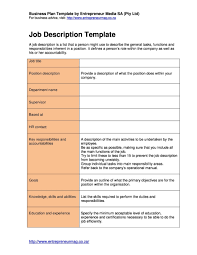The Importance of Job Descriptions
Job descriptions play a crucial role in the recruitment process for both employers and job seekers. They serve as a detailed outline of the responsibilities, requirements, and expectations associated with a particular role.
Key Components of a Job Description
A well-crafted job description typically includes:
- Title of the position
- Summary of the role
- Key responsibilities and duties
- Qualifications and experience required
- Skills and competencies needed
- Reporting structure
- Salary range and benefits
- Company culture and values
Benefits for Employers:
For employers, job descriptions help in attracting suitable candidates by providing clear expectations and requirements. They also serve as a basis for evaluating employee performance, setting goals, and determining compensation.
Benefits for Job Seekers:
Job descriptions are equally important for job seekers as they provide valuable insights into what a role entails. By carefully reviewing job descriptions, candidates can assess their suitability for the position, tailor their applications accordingly, and prepare effectively for interviews.
Tips for Writing Effective Job Descriptions:
- Use clear and concise language.
- Avoid jargon or industry-specific terms that may be unclear to candidates.
- List essential qualifications but be open to transferrable skills.
- Showcase the company culture to attract candidates who align with your values.
- Regularly review and update job descriptions to ensure relevance.
In Conclusion:
A well-crafted job description is more than just a list of duties – it is a powerful tool that can shape recruitment strategies, enhance candidate experiences, and drive organisational success. By understanding the importance of job descriptions, both employers and job seekers can navigate the hiring process with clarity and confidence.
Understanding Job Descriptions: Key Questions and Insights for Employers and Job Seekers
- What is a job description?
- Why are job descriptions important?
- What should be included in a job description?
- How can a job description benefit employers?
- How can job seekers use job descriptions to their advantage?
What is a job description?
A job description is a detailed document that outlines the specific roles, responsibilities, requirements, and expectations associated with a particular job position. It serves as a comprehensive guide for both employers and job seekers, providing clarity on the essential functions of the role, qualifications needed, reporting structure, and other pertinent details. A well-crafted job description not only helps attract suitable candidates but also sets clear parameters for performance evaluation and goal-setting within an organisation. Understanding what a job description entails is crucial for both employers and job seekers to ensure alignment between expectations and capabilities in the recruitment process.
Why are job descriptions important?
Job descriptions are essential in the recruitment process as they serve as a detailed roadmap outlining the responsibilities, requirements, and expectations associated with a specific role. They play a pivotal role for both employers and job seekers by providing clarity on the scope of work, necessary qualifications, and key competencies needed for success in the position. For employers, job descriptions help attract suitable candidates, set performance expectations, and guide employee development. Job seekers benefit from job descriptions by gaining valuable insights into what a role entails, enabling them to assess their fit for the position and tailor their applications accordingly. Overall, job descriptions are vital tools that ensure alignment between employer needs and candidate capabilities in the competitive world of recruitment.
What should be included in a job description?
When considering what should be included in a job description, it is essential to provide a clear and detailed overview of the role. This includes the job title, a concise summary of responsibilities, key duties and tasks, required qualifications and experience, necessary skills and competencies, reporting structure within the organisation, information on salary and benefits, as well as insights into the company culture and values. A comprehensive job description not only sets expectations for potential candidates but also serves as a valuable tool for employers in evaluating performance and aligning employee goals with organisational objectives.
How can a job description benefit employers?
A well-structured job description offers numerous benefits to employers. Firstly, it serves as a foundational document that clearly outlines the roles, responsibilities, and expectations associated with a specific position. This clarity helps in attracting suitable candidates who possess the required skills and experience. Additionally, a detailed job description can aid in setting performance expectations, evaluating employee progress, and aligning individual goals with organisational objectives. By providing a comprehensive overview of the job role, qualifications needed, and reporting structure, employers can streamline their recruitment process and ensure that they find the best-fit candidates for the position.
How can job seekers use job descriptions to their advantage?
Job seekers can leverage job descriptions to their advantage by carefully analysing the outlined responsibilities, qualifications, and skills required for a position. By aligning their own experience and abilities with the expectations set out in the job description, candidates can tailor their applications to highlight their suitability for the role. Additionally, job descriptions provide valuable insights into company culture and values, allowing job seekers to assess whether the organisation is a good fit for them. By utilising job descriptions as a roadmap for understanding employer expectations and showcasing their relevant skills, job seekers can enhance their chances of securing a position that aligns with their career goals and aspirations.

